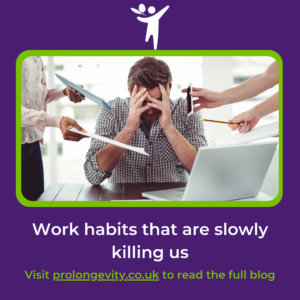Millions of people around the world work nights. In the United Kingdom, it’s more than three million – or 11.7% of the workforce. Beyond the apparent challenges of nocturnal labour, the profound impact on individuals’ health, relationships, and overall well-being cannot be overlooked or overstated.
Good sleep is absolutely foundational to our health. More on that, here:

Working late can impact relationships, social lives, and, of course, sleep which can all lead to the development of life-threatening diseases like heart disease and cancer. It also substantially weakens the immune system – not great when combatting Coronavirus
The NSF (National Sleep Foundation) recommends between seven and nine hours of sleep per 24 hours. However, those who work unsociable hours often only get between four to five hours of sleep. But even if they do get the recommended 8 hours, shift workers suffer permanent “social jetlag” because of their ever-changing work/sleep patterns which is so damaging to our natural diurnal rhythms.
ProLongevity understands the importance of sleep and the impact it can have on your overall health. Your lifestyle choices matter and making the right choices is something ProLongevity can help with. Backed up by the latest scientific research, delivering real results, and helping thousands of people across the UK, we can help you live longer, healthier, happier lives.
Generational Sleep Trends and Increasing Health Risks
In fact, the deleterious effects of shift work are SO severe that the World Health Association has classified shift work as an independent cancer risk in its own light.
As individuals age, the amount of sleep they obtain tends to decrease, creating a concerning trend across generations.
A survey by the American Academy of Sleep Science revealed that the older we get, the less sleep we have, with Generation Y (aged 20-34) getting six hours and 48 minutes of sleep on average, Generation X (aged 35-49) six hours and 25 minutes, and Baby Boomers (aged over 50) just six hours and 18 minutes.
This escalating pattern of sleep deprivation across generations poses a severe threat to public health, given the well-established links between inadequate sleep and chronic diseases.
How does that increase your risk of developing cancer or heart disease?
Studies have illuminated a particularly troubling connection between night shift work and the heightened risk of cancer, especially among women.
A study published by the American Association for Cancer Research in January, which examined more than 60 pieces of research, concluded that for every five years of night shift work, the risk of developing breast cancer among women increases by around 3.3%.
Whereas men are twice as likely as women to have a heart attack.
Through a study published in 2016, the American Heart Association (AHA) found that insufficient sleep and sleep-cycle disruption can impair the body’s natural rhythms and cardiovascular function.
Sedentary Lifestyle and Physical Health:
In the modern work culture, an increase in sedentary lifestyles is increasing. Many jobs require long hours of sitting, often in front of a computer screen. Prolonged periods of inactivity can contribute to a range of health issues, including obesity, cardiovascular problems, and musculoskeletal disorders. In fact, prolonged sitting turns out to be just as deleterious to our health as smoking.
Stress and Mental Health:
Work-related stress is a pervasive issue that can significantly impact both mental and physical health. High levels of stress at work have been linked to various health problems, including anxiety, depression, and even cardiovascular diseases.
Unhealthy Eating Habits:
Long work hours and tight deadlines can tempt us to opt for convenient but unhealthy food choices. Studies show that when we are short of sleep, we’re also hungrier. Poor nutrition not only affects our physical health but also has a profound impact on cognitive function and energy levels. As a result of this, both cardiovascular disease and health problems like diabetes become more frequent.
Lack of Work-Life Balance:
In an era of constant connectivity, achieving a healthy work-life balance has become increasingly challenging. Overworking can lead to burnout, negatively affecting mental health and diminishing overall job satisfaction. Without a work-life balance, this can lead to increased stress which in turn affects your lifestyle and overall health.
ProLongevity is a completely personalised weight loss, lifestyle, and nutrition program providing one-on-one coaching with a health professional to give you the tools to reduce your risk of life-limiting health problems, including dementia & heart disease. By having regulated sleep and healthy lifestyle choices, you can live healthier for longer. Here at ProLongevity, we’re here to help. Book your free 15-minute no no-obligation consultation to see how we can help.





